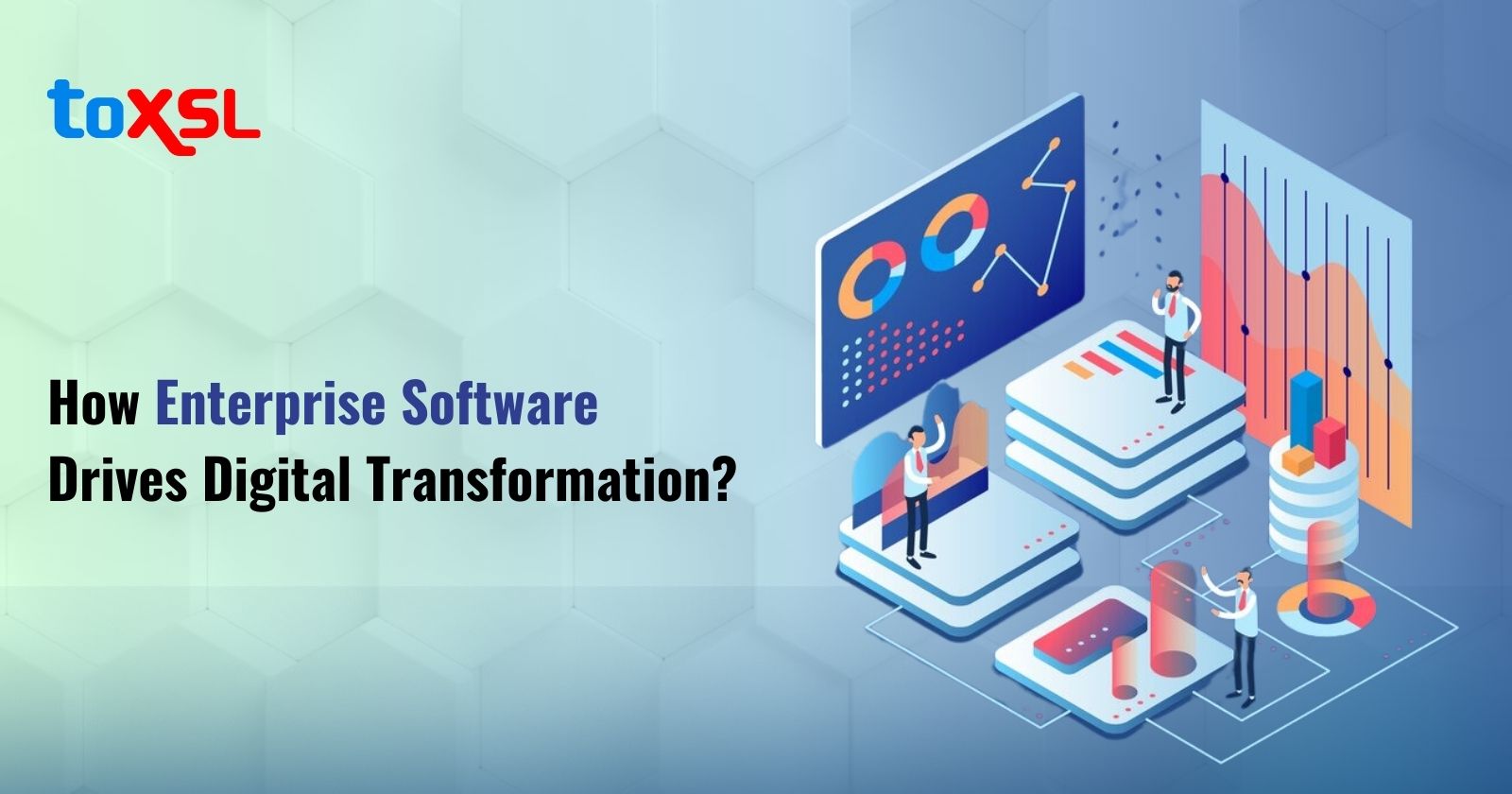- Feb 07, 2025
Share this post on:

No matter the size or sector, businesses must adapt and keep pace with the evolving technology landscape. According to statistics, the digital transformation market is expected to hit $2038.9 by 2028. Enterprise software plays a vital role in the process of digital transformation. Businesses are constantly seeking solutions that will help them optimize, streamline, and smoothen their transition processes. Enterprise software connects and aligns organizational processes.
Key Takeaways:
Digital transformation requires businesses to focus on customer experience, operational processes, and business models to grow and adapt.
Enterprise software is important for automating tasks, syncing data in real time, improving security, and enabling data-driven decision-making.
As digital change is ongoing, businesses should remain flexible, embrace scalable solutions, use agile methods, and regularly review strategies to stay competitive.
Key Areas of Enterprise Digital Transformation
MIT Solan Management Review talks about the following three key areas of enterprise digital transformation:
• Customer Experience: Helping businesses understand customers in more detail fueling customer growth, and developing more customer touch-points.
• Operational Processes: Businesses can enhance internal processes with digitization and automation. This helps them use digital tools and collect data to track performance, making more informed decisions.
• Business Model: Transform businesses by leveraging digital tools and services, introducing high-quality digital products, and taking help from technology to offer global shared services.
4Ps of Digital Transformation
With time, the market has evolved, and digital transformation is not just about changing business models. It helps businesses grow and is based on four key elements known as the 4Ps:
• Platform
• People
• Projects
• Processes
To be successful, these 4 elements need to work well with the current IT systems, including changes in the organization, manage change effectively, and develop new skills. When these elements come together, businesses can improve their operations and ensure their transformation goals match their overall goals. This helps them stay competitive and ahead of the ever-changing technical world. Also, if businesses want to develop a good digital transformation strategy, they must stay careful and knowledgeable. It means businesses must not hesitate to break the traditional ways of doing business. There are several important parts you need to focus on when developing your business strategy. Let’s look at these components.
Key Elements of Enterprise Software
In this section, we will discuss the major key components of enterprise software:
• Data Backups: Data backups save your businesses against unexpected attacks. Nowadays, businesses are opting for cloud storage, helping them ease the process of data backup. This lowers the chances of business suffering from unexpected downtime and data loss.
• Scalability: Enterprise software must be scalable to adjust with the growth of business. Digital transformation is poised to elevate your company, making scalability crucial to ensure that the software can accommodate growing workloads.
• Feasibility: Enterprise Software is feasible if it is practical to implement and maintain within the organization's existing infrastructure. It assesses whether the software can meet business needs without excessive costs or resource allocation.
• Computing Speed: The speed at which enterprise software processes data is important for a business’ operational efficiency. High computing speed allows for real-time data analysis and fast decision-making.
• Cloud-based Software: Cloud-based solutions offer flexibility, scalability, and accessibility for enterprise applications. They enable organizations to access their software and data from anywhere, enhancing collaboration and communication across teams.
Importance of Enterprise Software for Digital Transformation
Enterprise software propels smooth business processes by providing them with a single platform to manage, update, and access the numerous departments. This makes it easier for organizations to optimize business operations in the most cost-effective ways. Here are a few ways enterprise software contributes to digital transformation.
• Reduce Human Errors: Digital transformation means using technology to improve how organizations work. This involves bringing together different systems to make things better and more efficient. However, human errors can happen during this process, causing delays and mismanagement. Fortunately, enterprise software reduces the probability of errors by automating manual repetitive tasks and giving a secure platform for data exchange. In return, businesses can take advantage of optimum accuracy, and efficiency, and eliminate human error from the equation.
• Real-time Data Sync: Every business wants its data to sync in real time. This helps your teams access the same data, and make informed decisions. Enterprise software makes the goals achievable as the application integrates easily with internal systems, making it easy to transfer or share data across departments. This helps businesses maintain transparency and have clear communication between teams within a company.
• Data Analytics and Reporting: We are living in an era where data is the king. Data is the most crucial asset in any business, offering organizations deep insights regarding their business. Data defines the performance of all departments and individual employees. This way, businesses can identify the areas where improvements are required. Data gives useful and insightful stats and gives businesses real reports on numerous activities across various departments. Enterprise software allows teams to track their performance, forecast outcomes, and make smart decisions.
• Increases Data Security: Businesses, nowadays, are migrating to cloud-based software solutions. However, this has led to a rise in security challenges. Without proper security in place, your data might be vulnerable to cyberattacks or malicious manipulation. However, enterprise software can help businesses eliminate such risks by offering them centralized data and applications in a secure environment. This means businesses can easily access, manage, and update information without risking security.
• Workforce Performance: As digital transformation changes how organizations work, it's important to watch how your organization is handling these changes. Fortunately, enterprise software makes it easy to track the team's progress. It allows businesses to compare their performance to their goals. With this software, you can check the areas where your team needs help. This way, you can offer the right resources to ensure the productivity of your working environment.
What’s Next? The Future of Digital Transformation
Where is the new digital world leading us? Technology and markets are changing quickly, and it is hard to know how fast things will change. But one thing is clear, and it is that the change is happening. Companies need to be flexible, adaptable, well-informed, and ready to adjust to market changes to succeed in this fast-moving environment. Digital transformation is not a one-time project. It is a continuous process of improvement, adaptation, and discovery.
As new technologies are emerging, consumers need change. To fulfill the needs of consumers, it becomes mandatory for companies to assess and integrate innovations in their business operations. However, there are a few ways that can help businesses stay flexible in the changing digital landscape:
Use Scalable Solutions: Choose technologies that can grow and change as business changes. This way, businesses can add new features or make changes without needing to spend a lot of money on big updates.
Agile Methods: Businesses must encourage their teams to use agile practices. This helps everyone respond quickly to changes and always look for ways to improve.
Review Your Strategy Often: As things change, your plans need to change too. Businesses must regularly check their digital strategy, technology, and workflows to make sure they still fit their goals and the market.
Embrace Feedback: Develop strong ways to get feedback from customers, employees, and experts. Also, listen to your team member's ideas and use them to improve your plans and find new opportunities.
Invest in Research and Development: Research and development help companies stay ahead of the game. It helps leaders stay updated, and explore new tools and ideas to enhance their understanding.
Conclusion
Digital transformation is crucial for modern businesses. Businesses embracing digital transformation can easily improve operational efficiency, enhance customer experiences, and increase revenue. However, implementing digital transformation can be challenging and requires careful planning, strong leadership, and a commitment to keep improving. By choosing the right technology partner, businesses can focus on these important areas. This can help them stay ahead of the competition in a fast-changing digital world. The main thing is to stay flexible and ready to change, always checking and adjusting plans to stay ahead. With the right approach, digital transformation can lead to long-term success.
ToXSL Technologies is a leading enterprise software development company, committed to offering the most secure and scalable solutions for the business globally. Get in touch with us today and let us help you leverage the power of technology.









